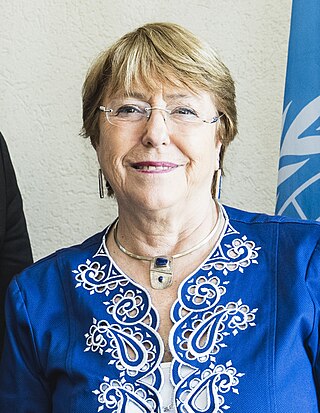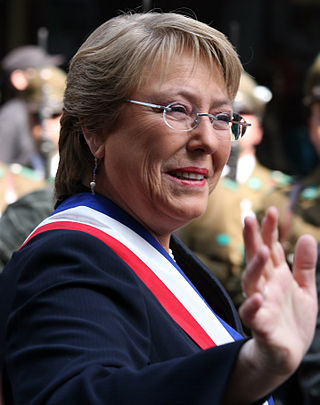| |||||
| Decades: | |||||
|---|---|---|---|---|---|
| See also: | |||||
The following lists events that happened during 1951 in Chile.
| |||||
| Decades: | |||||
|---|---|---|---|---|---|
| See also: | |||||
The following lists events that happened during 1951 in Chile.

The Socialist Party of Chile is a centre-left political party founded in 1933. Its historic leader was President of Chile Salvador Allende, who was deposed in a coup d'état by General Augusto Pinochet in 1973. The military junta immediately banned socialist, Marxist and other leftist political parties. Members of the Socialist party and other leftists were subject to violent suppression, including torture and murder, under the Pinochet dictatorship, and many went into exile. Twenty-seven years after the 1973 coup, Ricardo Lagos Escobar won the Presidency as the Socialist Party candidate in the 1999–2000 Chilean presidential election. Socialist Michelle Bachelet won the 2005–06 Chilean presidential election. She was the first female president of Chile and was succeeded by Sebastián Piñera in 2010. In the 2013 Chilean general election, she was again elected president, leaving office in 2018.

Verónica Michelle Bachelet Jeria is a Chilean politician who served as United Nations High Commissioner for Human Rights from 2018 to 2022. She previously served as President of Chile from 2006 to 2010 and from 2014 to 2018 for the Socialist Party of Chile. She is the first woman to hold the Chilean presidency. After leaving the presidency in 2010 and before becoming eligible for re-election, she was appointed as the first executive director of the newly established United Nations Entity for Gender Equality and the Empowerment of Women. In December 2013, Bachelet was re-elected with over 62% of the vote, surpassing the 54% she received in 2006. She was the first President of Chile to be re-elected since 1932. Bachelet, a physician who has studied military strategy at the university level, previously served as the Health Minister and Defense Minister under her predecessor, Ricardo Lagos. She is a separated mother of three and identifies as an agnostic. In addition to her native Spanish, she speaks English fluently and has some proficiency in German, French, and Portuguese.

General elections were held in Chile on Sunday, 11 December 2005 to elect the president and members of the National Congress. None of the four presidential candidates received an absolute majority, leading to a runoff election between the top two candidates — Michelle Bachelet from the Coalition of Parties for Democracy and Sebastián Piñera from National Renewal — on Sunday, 15 January 2006. Bachelet was victorious with 53.49% of the vote. She succeeded President Ricardo Lagos on 11 March 2006, for a period of four years, after Congress reformed the Constitution in September 2005 and reduced the term from six years.

Claudio Huepe García was a Chilean politician, engineer and economist, member of the Christian Democrat party, who occupied several government and political positions. During his career, he was the provincial governor of Arauco, a member of the Chilean Chamber of Deputies, a government minister, and the Chilean ambassador to Venezuela. He was also among the first in his party to reject the 1973 coup by Pinochet and was exiled by the military dictatorship from 1975 until 1984.

The first lady of Chile is the title for the wife of the president of Chile, who is traditionally responsible for directing and coordinating activities in the social field of the presidency and accompanying the president in ceremonies or official activities, for example, on state visits. Although not an official title, it is widely used in formal protocol and has been used in some decrees.

On 11 March 1990, Chile the military regime of General Augusto Pinochet ended and was replaced by a democratically elected government. This transitional period lasted roughly two years although some processes may have lasted significantly longer. Unlike most democratic transitions led by either the elite or the people, this democratic transition process is known as an intermediate transition – a transition involving both the regime and the civil society. Throughout the transition, as the regime increased repressive violence, it simultaneously supported liberalization – progressively strengthening democratic institutions and gradually weakening that of the military.

The Santa María School massacre was a massacre of striking workers, mostly saltpeter works (nitrate) miners, along with wives and children, committed by the Chilean Army in Iquique, Chile, on December 21, 1907. The number of victims is undetermined but is estimated to be over 2,000. The massacre occurred during the peak of the nitrate mining era, which coincided with the Parliamentary Period in Chilean political history (1891–1925). With the massacre and an ensuing reign of terror, not only was the strike broken, but the workers' movement was thrown into limbo for over a decade. For decades afterwards, there was official suppression of knowledge of the incident, but in 2007 the government conducted a highly publicized commemoration of its centenary, including an official national day of mourning and the reinterment of the victims' remains.

Ricardo Andrés Lagos Weber, son of former Chilean president Ricardo Lagos, is a politician who served as the Ministry General Secretariat of Government of Chile in the administration of former President Michelle Bachelet after having worked for Bachelet's 2005-2006 campaign. He is trained in law and economics, and has served the majority of his government career in economic positions. He was also an organizer and the senior representative for Chile at the Annual Meeting of APEC held in Chile in 2004, in addition to being one of the architects of the free trade agreements that Chile signed with the United States and the European Union as the head of the Foreign Ministry's Department of Trade Policy. He is a member of the Party for Democracy (PPD). Between March 2016 and March 2017 he was President of the Senate of Chile.

The lives, roles, and rights of women in Chile have gone through many changes over time. Chilean women's societal roles have historically been impacted by traditional gender roles and a patriarchal culture, but throughout the twentieth century, women increasingly involved themselves in politics and protest, resulting in provisions to the constitution to uphold equality between men and women and prohibit sex discrimination.
The humanitarian response to the 2010 Chile earthquake included national governments, charitable and for-profit organizations from around the world which began coordinating humanitarian aid designed to help the Chilean people.

Camila Antonia Amaranta Vallejo Dowling is a Chilean communist politician and former student leader. A member of the Communist Party of Chile, she has been serving as the Minister General Secretariat of Government since 11 March 2022. Previously, Vallejo worked as a member of the Chamber of Deputies of Chile, representing District 26 of La Florida, Santiago.
Events in the year 1973 in Chile.
Events in the year 1974 in Chile.
The following lists events that happened during 2008 in Chile.
The following lists events that happened during 1950 in Chile.
The following lists events that happened during 1954 in Chile.
The following lists events that happened during 1971 in Chile.

The Ñuble Region officially the Region of Ñuble, is — since 5 September 2018 – one of Chile's sixteen regions. It spans an area of 13,178.5 km2 (5,088 sq mi), making it the smallest region in Chile in terms of area, and is administratively constituted by 21 communes. It has a population of 480,609 inhabitants. Its capital is the city of Chillán.

Aurora Elvira Williams Baussa is a Chilean business engineer. She was the Chilean Minister of Mining from 11 March 2014 to 11 March 2016. In an August 2023 Cabinet reshuffle, Boric re-appointed Williams as Minister of Mining, where she would replace Marcela Hernando.